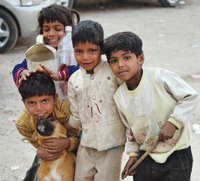Following close on the heels of prime minister Dr. Manmohan Singh’s confession at the recently held (November 21-22) HT Leadership Summit in New Delhi, that his “greatest ambition” is to witness India trans-forming into a fully-educated country, has come Unesco’s Education for All Global Monitoring Report 2009, slamming governments around the world for their failure to tackle deep and persistent inequalities in education, and consigning millions of children to a life of poverty and diminished opportunity.
The report, which was released on November 25 in Paris and world capitals, blames a combination of factors — political indifference, weak domestic policies, and the failure of aid donors to deliver commitments. It warns that “unacceptable” national and global education disparities are undermining efforts to achieve the United Nations’ millennium development goals (MDGs). “When financial systems fail, the consequences are highly visible and governments act. When education systems fail, the consequences are less visible but no less real. Unequal opportunities in education fuel poverty, hunger and child mortality, and reduce prospects for economic growth. That is why governments must act with a greater sense of urgency,” commented Unesco’s D.G. Koichiro Matsuura while releasing the EFA Global Monitoring Report 2009.
 The report says that the world is far removed from achieving the MDG of universal primary education by 2015, with 75 million children of primary school age out of school, and 29 million likely to remain out of school even in 2015. Kailash Satyarthi of the Delhi-based Bachpan Bachao Andolan (Save the Childhood Movement), and member of Unesco’s international review committee on EFA goals, says that if the MDG goal of every child completing primary education by 2015 is to be attained, they should all be enrolled in school by next year (2009) — an impossibility given current trends.
The report says that the world is far removed from achieving the MDG of universal primary education by 2015, with 75 million children of primary school age out of school, and 29 million likely to remain out of school even in 2015. Kailash Satyarthi of the Delhi-based Bachpan Bachao Andolan (Save the Childhood Movement), and member of Unesco’s international review committee on EFA goals, says that if the MDG goal of every child completing primary education by 2015 is to be attained, they should all be enrolled in school by next year (2009) — an impossibility given current trends.
Launching a frontal attack on the Union government, Satyarthi says: “The government failure to pass the Right to Education Bill 2008 after so many years of deliberation, and the failure to abolish child labour after 40 years of promises, indicates its lack of seriousness.”
Likewise Unesco’s EFA Global Monitoring Report 2009 is critical of government effort on the issues of high drop-out rates and quality. “One assessment in India found that just under half of grade III pupils could read a text of grade I pupils.” The report is also critical of India’s child healthcare record stating that one in three children in developing countries, i.e. 193 million children, suffer brain development and education impairment because of malnutrition, and that high annual rates of economic growth have made minimal impact in abating child malnutrition. Moreover commenting on the plight of the girl child, the report says there are huge gaps in enrollments across much of south Asia and Sub-Saharan Africa.
Yogender Bhushan, founder-director of the Jaipur-based Bodh Shiksha Samiti and national convener of the core group of education NGOs active in 11 states, says that the criticism made by EFA Global Monitoring Report 2009 is justified. “The tall claims of 97 percent enrollment made by the Union government shouldn’t be taken at face value. In remote and backward areas, it comprises a list of children who visiting officials find in the area. Unless governance is improved, accountability is demanded, and parental involvement is encouraged, the issues of learning outcomes and retention will continue to negate claimed achievements of our education system. The bureaucracy has lost the ability to manage education in this country and there’s no denying that the government school system is in bad shape. Local capacity building, involvement and decentralisation are necessary to achieve the EFA goals in real terms.”
The report also lambastes the donor community for a “collective failure” to deliver aid commitments, stating that allocations for basic education have stagnated since 2004. But given the economic meltdown in the West, reliance on this source of income to raise teaching-learning standards in developing countries is certain to prove an exercise in futility.
If prime minister Manmohan Singh truly wished to “see India not only as a land of free people, but of a knowledge-empowered people”, as he declared at the recently concluded HT Leadership Summit, he would have re-cast his government’s spending priorities and boosted investment in education. He had a unique opportunity to do so during the past four years, but he blew it.
Autar Nehru (Delhi)